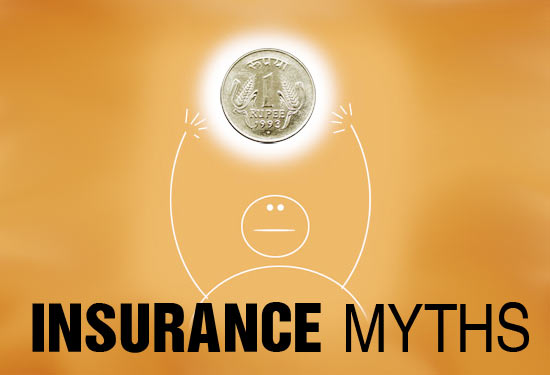 | « Back to article | Print this article |
Top 5 life insurance myths
Though very popular, these harm the policyholder's long-term insurance objectives.
Myth 1: I should go for 'trusted' names
Fact
Insurance companies are often bad investment managers. Therefore, you should go to them for insurance only (the term plan), and not for investment products.
If you take a pure term plan, you can go for the cheapest option, not necessarily from a 'trusted' insurance company. Regulations ensure that all insurers adhere to strict risk management procedures, so your policy is safe.
There is no additional benefit you get by going to a 'trusted' name.
In the event you are clubbing investment with insurance (though you are advised not to do so), you would again do well to check the insurer's fund management history. A 'trusted' name only means that they have been around longer. It is no guarantee that they give superior returns in their funds.
The author is director at Fintotal Insights and Resources Pvt Ltd. He can be reached at info@fintotal.com.
Courtesy:
Top 5 life insurance myths
Fact
Many agents in India are poorly trained about the insurance products they are selling. Worse, they tend to focus only on products that give them the highest commissions, instead of products that are actually relevant or useful for you.
Indeed, there have been several cases of mis-selling over the years, with many of these proving disastrous for the hapless investors involved.
With any financial product (and more importantly in insurance), you should get neutral unbiased advice before you approach an agent for buying a product. Nowadays, more and more insurance plans are available for application online.
Online, unbiased evaluation of products is getting even more common. You should ideally explore this online channel for analysis and even purchase.Top 5 life insurance myths
Myth 3: I already have 2 to 3 insurance policies. I need no further insurance
Fact
What counts is your total life cover, not the number of policies you hold.
Do total up the life cover in all your policies and check whether it is 4 to 8 times your annual income. If not, it is likely you have been a victim of mis-selling.
You would be strongly advised to go for a pure term policy that gives you a life cover of 4 to 8 times annual income. One such policy is enough for an individual; but even 2 to 3 mis-sold policies may not be.
Top 5 life insurance myths
Myth 4: A new pension plan or child plan I saw in an advertisement is worth considering
Fact
In most cases, no! What you need in terms of insurance is a good term plan that gives you a life-cover 4 to 8 times your annual income. Thereafter, you can shut your ears to all insurance plans (even if called by any other name)! You can then think of building a good investment portfolio of mutual funds or stocks.
Most of these pension or child plans carry huge transaction costs. They leave you under-insured, and are exceedingly complex for you to decipher their returns (which are anyway almost always bad). You would rather stay away from them.
Top 5 life insurance myths
Myth 5: An investment-cum-insurance plan hits two birds with one stone
Fact
Such plans are, in fact, disastrous for you.
They carry high commissions for the agent, so s/he may recommend them strongly. However, from your perspective, such products suffer from high charges, lack of transparency and lack of flexibility.
Stay clear of them, and opt instead for a pure insurance plan (also called a term plan).




